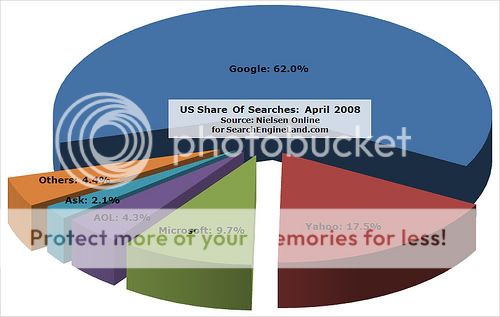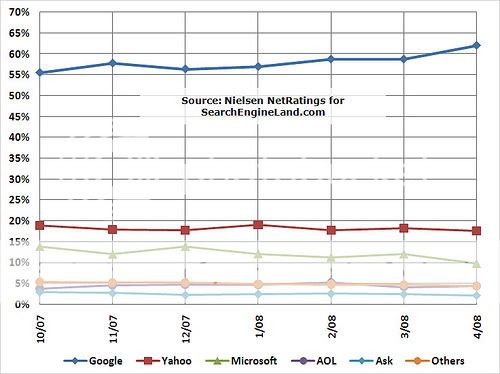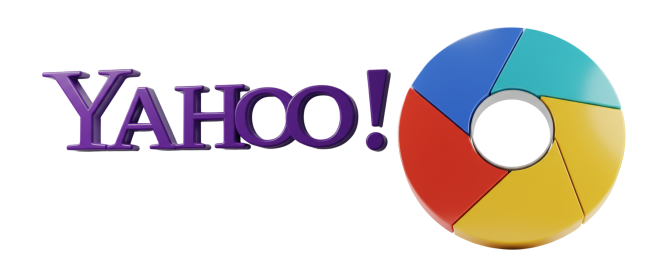Does the Microsoft Giant Really Need a Search Engine Leg Up from Yahoo?
Author: April Hall
Internet Copywriter
Yes. Microsoft needs help. The reality is that Microsoft comes in a distant third to Google and Yahoo when it comes to search engine marketing. Further, Yahoo barely comes within striking distance–or, rather, doesn’t even come close to striking distance–to Google’s share of internet searches:

So, what’s poor lil’ Microsoft to do when it comes to vamping up its presence in the search engine market? Why, make a unsought-after $4 billion offer to combine forces with Yahoo! Sounds like an offer that Yahoo couldn’t refuse, right? Wrong.
Many Yahoo execs, including the CEO and the President, are apparently not so keen on the whole idea of combining forces with Microsoft. And who could blame them? In a merger with a company as all-encompassing as Microsoft is, what organization would not have qualms about losing its own identity and interests? Yahoo shareholders may end up better off after a merger with Microsoft (I’m no economist by any means, so please don’t take my word for this!), but the individuals who founded Yahoo have definite doubts about the ability the company would have maintaining its original identity after such a merger.
Why can’t Microsoft figure out on its own how to garner success in internet searches, anyway? Not only does Microsoft and Yahoo not have a large piece of the search engine pie, both companies seem to be getting progressively smaller pieces. Danny Sullivan at Search Engine Land has a great discussion, including some wonderful graphics, that delves into the ever-diminishing success of these two companies in comparison to Google. He illustrates this phenomenon with this graph:

If Microsoft and Yahoo are so smart (and I don’t think anyone will doubt the intellect of the people who run these phenomenal companies), why can’t they out-do Google on their own? Perhaps some of the success of Google is self-perpetuating: people get comfortable using a certain search engine, so they just continue to use it out of mote habit. But, a lot of it is a result of the ease of use and simple advertising saturation of Google, isn’t it?
What does this mean for you as you work with SEO strategies?
Very simply, it means to continue to focus on Google by learning how to be successful with this search engine and constantly improve your rankings. In an earlier post I mentioned how to use the Google Adwords Tool, which is a great way to get started. Of course, you cannot ignore Microsoft, Yahoo, Ask Jeeves, and the ol’ school favorite AOL when deciding how to pursue search engine rankings success; but the facts are the facts. Google is the overwhelming favorite search engine, which means those of us who work in SEO need to figure out how to get our pages the nod of those Google crawlers.
Whatever happens with Microsoft and Yahoo, let’s not feel too sad for Bill Gates and his lack of success on the internet. He’s a smart (and remarkably rich) guy. He and his company will be just fine.

